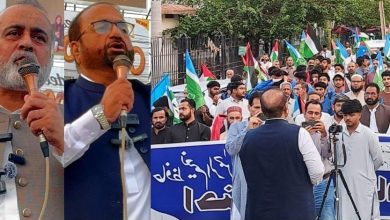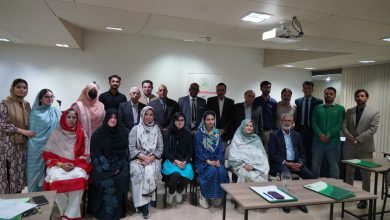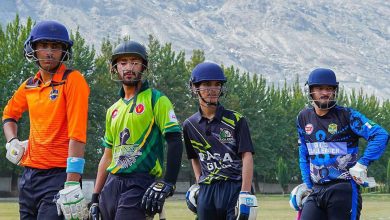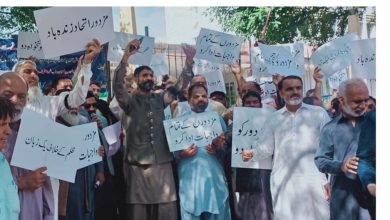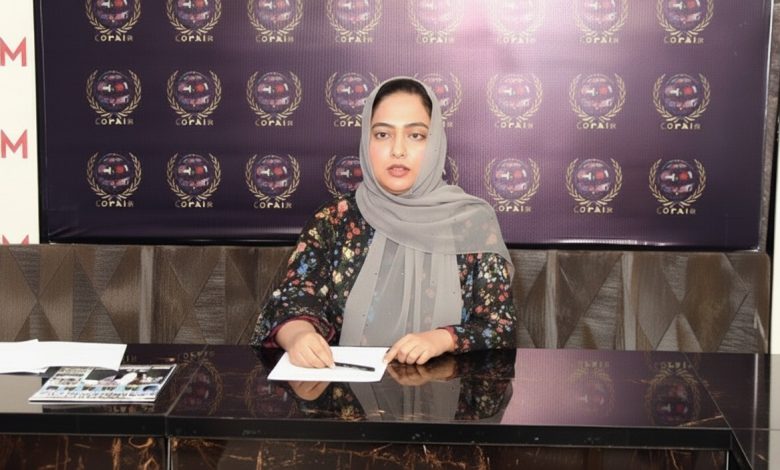
Amna Munawar Awan Champions Economic Diplomacy and Regional Connectivity Between Pakistan and Iran
Islamabad: At the same Pakistan–Iran Connectivity Forum organized by the Center of Pakistan and International Relations (COPAIR) and Pakistan in the World, Amna Munawar Awan (Amna Malik), Chairperson of COPAIR, delivered a powerful and visionary speech outlining a practical roadmap for strengthening Pakistan–Iran relations. Her address focused on economic diplomacy, business integration, regional alliances, and people-to-people connectivity as the foundation for lasting peace and prosperity.
Welcoming Dr. Reza Amiri Moghadam, Ambassador of Iran, and Tazeen Akhtar, Editor of Pakistan in the World, Awan described the event as a meeting that could “connect two countries and two continents.” She said the objective of COPAIR’s think tank was not just policy advocacy but policy implementation—linking research, business, and diplomacy to produce real-world change.
“Economic interest plays a vital role in the foreign policy of any country,” Awan stated, adding that Pakistan and Iran can strengthen relations through trade, business forums, and shared infrastructure. She noted the presence of advisors Khalid Lateef and Colonel Ahmed, who are contributing to research and economic outreach, including projects that engage academia, youth, and the business sector.
Awan praised Uzbekistan’s participation in the forum, acknowledging that “Uzbekistan is providing us with the rail and infrastructural connectivity that will help increase trade between Pakistan, Iran, and Central Asia.” She said the presence of the Uzbek Deputy Head of Mission reflected the expanding importance of regional cooperation.
Speaking on regional dynamics, she stressed, “In an era where the Middle East is being reshaped by fast-moving political and economic changes, Pakistan and Iran must serve as anchors of stability. Our shared heritage calls us to embrace connectivity not as a dream but as an urgent necessity.”
Awan emphasized that both countries share not only ideological but also emotional bonds. “Pakistan and Iran have always stood by each other—during Pakistan-India tensions and even during Iran-Israel conflicts. This shows that our hearts, not just our policies, are aligned,” she said.
The COPAIR Chairperson explained that the meeting’s agenda was divided into two parts: policy discussion and member participation. The first session featured expert analyses from advisors, while the second allowed participants to identify challenges and propose opportunities for collaboration. “We must identify gaps where improvement is needed, especially in border trade markets, energy cooperation, cultural exchanges, and tourism,” she said.
She announced COPAIR’s plan to prepare policy papers and research publications focused on practical solutions. “We will not stop at theory. We will ensure implementation through collaboration between government, academia, and business,” she asserted.
Awan highlighted that border markets between Pakistan and Iran must be supported through a legal framework and that barter trade could play a key role in balancing both countries’ economic challenges. “Businesses from Islamabad and Karachi are joining us because they want practical engagement, not just talk,” she said.
She also called for greater public awareness of trade, tourism, and education opportunities. “We will document opportunities in religious tourism, education, and business so that investors, students, and pilgrims know where and how to engage,” she announced.
Recognizing the challenges ahead, she pointed to bureaucratic hurdles and regional instability but remained optimistic: “We are building an approach that is not reactive but futuristic. Policy advocacy must be backed by action.”
Awan revealed that COPAIR will host a follow-up session in collaboration with the National Security Division, focusing on Pakistan’s Middle East policy. She said, “We will send a copy of our findings to the Iranian Embassy as well, because this is the right time to act.”
In closing, Amna Munawar Awan reaffirmed that Pakistan’s path to growth lies in economic diplomacy and regional cooperation. “By connecting geography with history, and policy with business, we can turn Pakistan and Iran into a bridge for peace, prosperity, and progress.”

